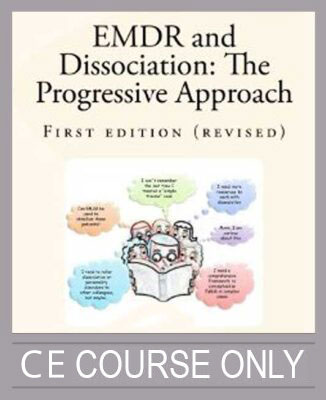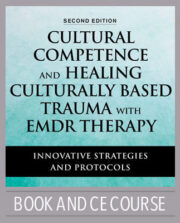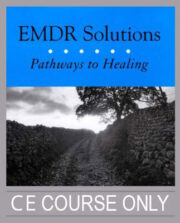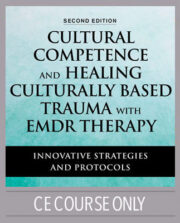EMDR and Dissociation: The Progressive Approach, Dolores Mosquera Book Study (12 CE Hours)
$99.00
This Home Study Program offers an opportunity to earn 12 CE hours(EMDRIA, Psychologists, LCSW, LMFT, LMHC, LPC and other master’s level clinicians. Check with state licensing board to confirm acceptance of NBCC credits). The book itself (not included) is the educational content of this program. By passing the CE program quiz developed for this program, you will demonstrate that you have gained knowledge by reading this book.
The book is not included in the purchase of this CE program. To purchase a copy of the book, click HERE or HERE.
by Dolores Mosquera and Anabel Gonzalez
book purchased separately
Learn some of the basic aspects that therapists must understand in order to adequately apply EMDR in the more severe cases, including dissociative disorders, personality disorders and different types of complex traumatization.
After many early cautions about the potential dangers of using EMDR with individuals suffering from dissociative disorders, limited proposals have been offered for adapting EMDR procedures to this specific population. Based on these early cautions, EMDR is still considered by many clinicians as offering interventions that are limited to the treatment of traumatic memories in high functioning dissociative clients and only after a long preparation phase that depends on other treatment modalities. From this conceptualization, the use of EMDR is strongly limited and many survivors of severe traumatization are seen as unable to benefit from EMDR and, if at all, only much later in the treatment process.
Gonzalez & Mosquera (2012) have developed and articulate in this book their progressive approach model for treating complex trauma and dissociation. Using this model, clinicians can safely utilize a wide range of EMDR interventions from early in the preparatory phase of treatment for patients with dissociative disorders. Numerous clinical case examples illustrate interventions with EMDR for dissociative clients following this model allowing clinicians to safely utilize a wide range of EMDR interventions from early in the preparatory phase of treatment for patients with dissociative disorders. EMDR therapists will learn new interventions to implement at different phases of treatment.
(Click here to preview the book’s table of contents.)

Dolores Mosquera is a psychologist and psychotherapist. She is the director of the Institute for the Study of Trauma and Personality Disorders (INTRA-TP), a private institution where she has worked with EMDR for many years on cases related to severe traumatization. She is an EMDR Europe Consultant and Facilitator. She has extensive teaching experience, leading seminars, workshops and lectures internationally. She has published many books and articles on personality disorders, complex trauma and dissociation and is a recognized expert in this field.

Anabel Gonzalez, MD, PhD, works as a Psychiatrist and Psychotherapist in the Public Mental Health System and in private practice. She heads the Trauma and Dissociation Program included in the Severe Mental Disorders Unit at the University Hospital of A Coruña, Spain. She has broad clinical experience with dissociative and psychotic disorders. Trained in different psychotherapeutic approaches, she is an EMDR Trainer and Consultant. She offers regular advanced trainings with the Spanish EMDR Association, and has presented several workshops on EMDR interventions in dissociative disorders, personality disorders, and psychosis. She is a board member of the ESTD and Vice-President of the Spanish EMDR Association. She is the author of several articles, presentations, and books about EMDR, complex trauma, and dissociation.
Learning objectives:
|
|
Key Features:
|
|
WHAT’S AVAILABLE?
|
Instructions after purchase of book study program:
1. After completing your purchase, you will receive an email receipt verifying your purchase with a link to a quiz based upon the book’s content.
2. For your convenience, you will be provided a downloadable PDF version of the quiz to use while you read.
3. To earn your CE hours, you must answer the quiz questions online.
4. When you complete and pass the quiz, you will be issued a downloadable certificate for EMDRIA and NBCC approved Masters Level professional certificate with CE hours documented
EMDR International Association:
EMDR Advanced Training & Distance Learning, LLC is an EMDRIA Approved Credit Provider (#07002) and maintains responsibility for this program and its content in accordance with EMDRIA standards.
National Board for Certified Counselors:
EMDR Advanced Trainings & Distance Learning, LLC has been approved by NBCC as an Approved Continuing Education Provider, ACEP No. 6709. Programs that do not qualify for NBCC credit are clearly identified. EMDR Advanced Training and Distance Learning, LLC is solely responsible for all aspects of the program.
American Psychological Association:
Advanced Psychotherapy Trainings (APT) is approved by the American Psychological Association to sponsor continuing education for psychologists. APT maintains responsibility for this program and its content.


The book is not included in the purchase of this CE program. To purchase a copy of the book, click HERE or HERE.
Cancellation/Refund Policy: Requests for program purchase cancellation/refund must be in writing to info@emdradvancedtrainings.com no later than 2 weeks after registering for the program. Refunds will be 75% of purchase price. No refund will be given for requests made past this timeframe or for those programs for which the attendee has already obtained CE hours.
Note: you should receive an automatic confirmation email for your order. If you do not, please check your spam filter and/or tabs. If you still cannot find your receipt, please email info@emdradvancedtrainings.com.







